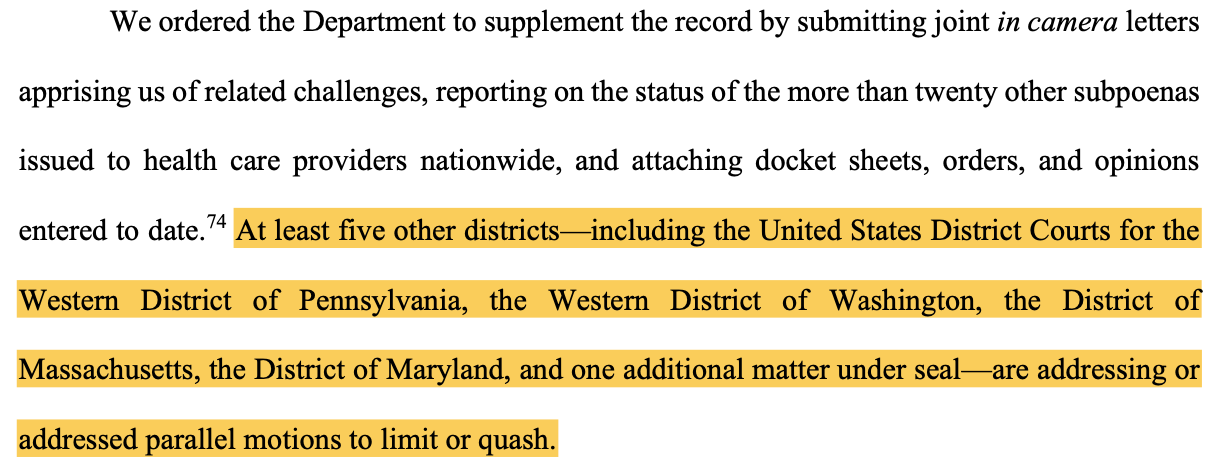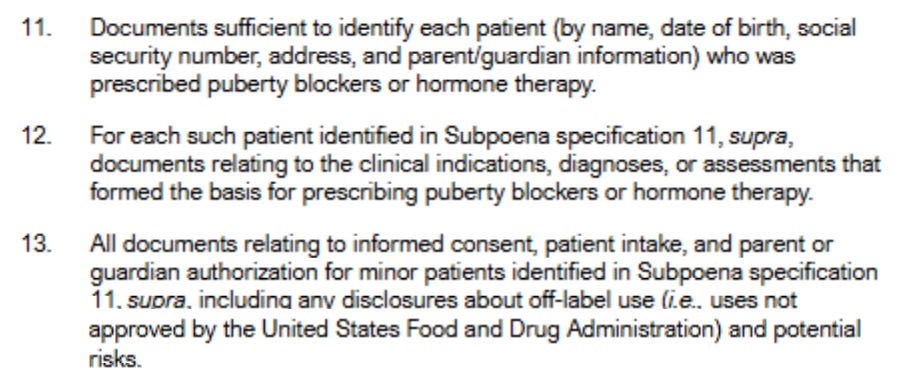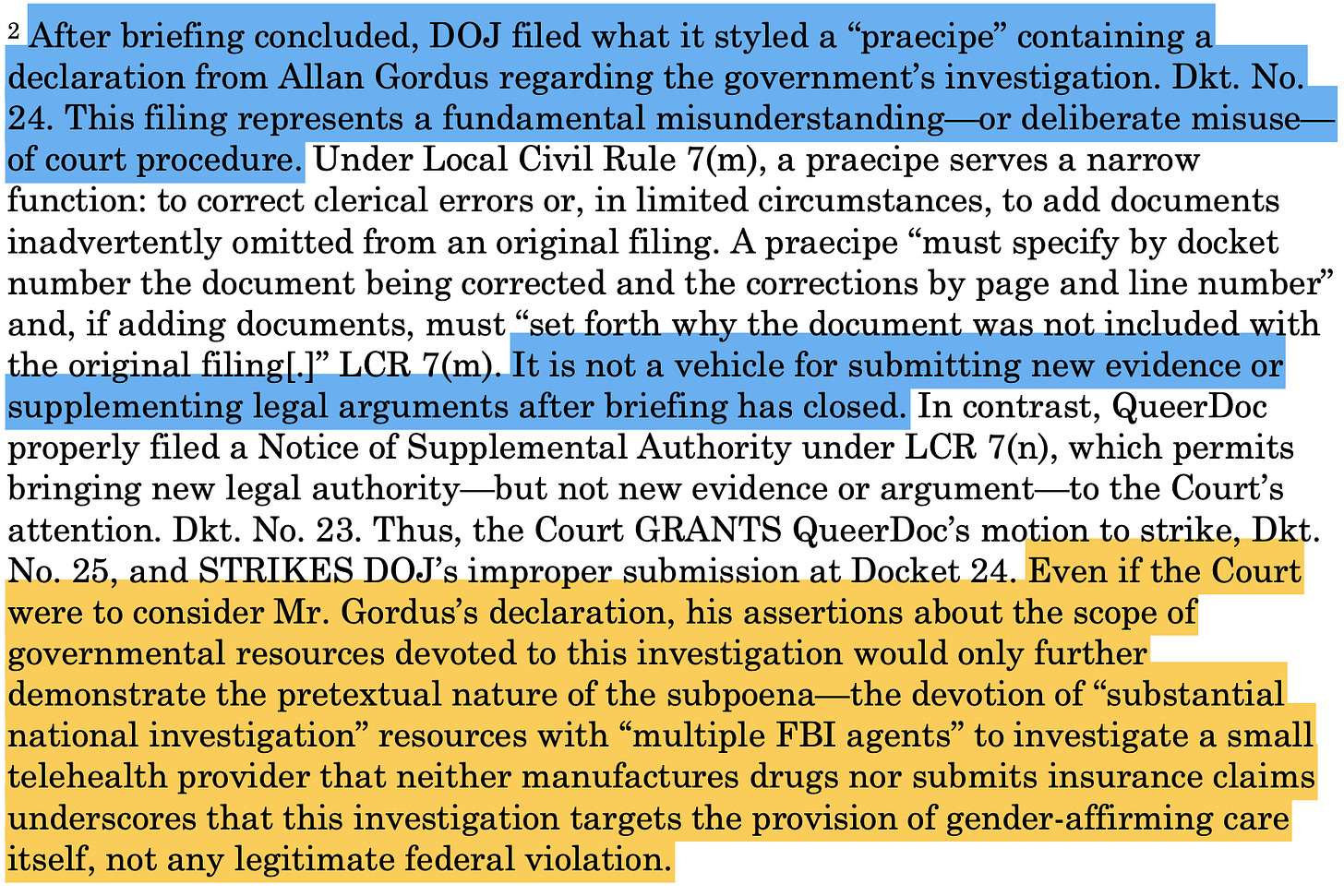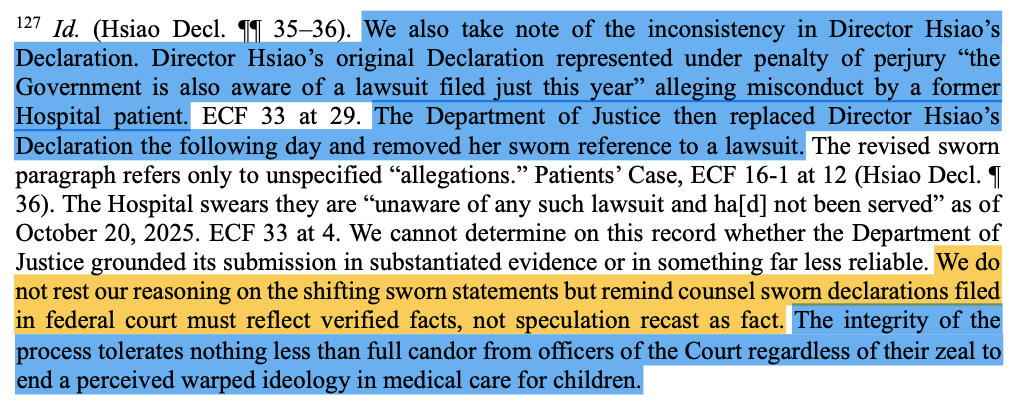Multiple judges call out DOJ's methods of defending its invasive trans care subpoenas
A trio of public rulings, including one on Friday, all side with providers. Two rulings also raised sharp questions about DOJ's moves in recent months.
One part of the Trump administration’s multi-pronged attack on transgender people has repeatedly hit a roadblock this fall, as at least four federal judges have blocked portions of or the entirety of the Justice Department’s invasive subpoenas served in June on 20 providers of gender-affirming medical care for trans minors.
The most recent of those rulings came on November 21 in a challenge brought by Children’s Hospital of Philadelphia.
And while the subpoenas and three public rulings have received news coverage in recent months, a significant aspect of multiple rulings has gone unreported until now: Two federal judges have directly questioned the actions of the Justice Department’s lawyers involved in the cases.
In issuing his November 21 ruling, U.S. District Judge Mark Kearney “expressed concern with the veracity“ of a declaration submitted by the Justice Department in seeking to justify the subpoena of the Philadelphia hospital and noted that the Justice Department’s lawyers “recognize false statements may be subject to a perjury investigation.“
Last month, meanwhile, U.S. District Judge Jamal Whitehead stated that the Justice Department’s effort to submit a different declaration in a challenge before him represented either “a fundamental misunderstanding“ or “deliberate misuse” of the court’s procedures.
The extremely rare comments from multiple federal judges are both signs of the growing frustration from the bench about the unprofessionalism of the Justice Department in the second Trump administration under the leadership of Attorney General Pam Bondi and more evidence of the overly aggressive — and ultimately illegal — way the administration is attacking transgender people.
The subpoenas, which I covered previously at Law Dork, seek extensive, detailed, invasive information about the providers of gender-affirming medical care for trans minors, including their employees, communications, and patients. The Justice Department has explicitly linked the subpoenas to President Donald Trump’s January 20 executive order defining “sex” as binary and biological sex assigned at birth, his follow-up January 28 executive order targeting gender-affirming medical care for trans minors, as well as Bondi’s April 22 memo purporting to implement those orders.
Because Kearney, an Obama appointee, earlier ordered the Justice Department to turn over information about any other challenges to the subpoenas, we now know that challenges have been raised to at least six of them.
The news came in Kearney’s lengthy ruling tossing out the patient-centered requests in the subpoena served on the Children’s Hospital of Philadelphia — three provisions that, as Kearney wrote, involve “exceptional privacy interests.“
Public rulings have now been issued as to three of those challenges — U.S. District Judge Myong Joun’s opinion siding with Boston Children’s Hospital in Massachusetts, Whitehead’s opinion siding with QueerDoc in Washington state, and Kearney’s ruling in Pennsylvania.
Joun and Whitehead’s decisions quashed the entirety of the subpoenas issued in those cases. The Justice Department had appealed Joun’s decision to the U.S. Court of Appeals for the First Circuit on November 7. Around the same time as Kearney’s ruling, DOJ filed a notice that it was appealing Whitehead’s decision as well, to the U.S. Court of Appeals for the Ninth Circuit.
Kearney, in a footnote, also provided information about a third subpoena quashed. Of the case, “which remains entirely under seal,” Kearney wrote, “Our colleague also quashed the subpoena in its entirety for similar statutory authority reasons.“ No other information is available about that case.
[UPDATE, 11:59 p.m. ET, December 12: Information was unsealed making it known that the third quashed subpoena referenced in Kearney’s opinion had been directed at Seattle Children’s Hospital:
The order from U.S. District Judge John Chun, a Biden appointee, can be found here.]
Kearney, however, was only asked to strike the three patient-specific requests and related information required in the other requests.
Of these requests, Kearney wrote the records fall at “the highest end of the intimate and personal spectrum,” noting they include “deeply personal disclosures by children about their bodies, sexuality, trauma, family dynamics, self-harm, mental-health history, and cognitive and emotional functioning.”
But Kearney only discussed the privacy interests as a secondary reason to strike the requests. Primarily, he ruled, DOJ was painting outside the law. Of the Department’s argument that the subpoenas were an appropriate use of the authority Congress granted it (18 U.S.C. 3486) to investigate federal health care offenses (21 U.S.C. 331), Kearney characterized it as “a uniquely misplaced view of its ability to expand the limits Congress imposed” on DOJ.
“Congress never authorized a roving mandate to regulate and alter state-licensed medical care,” he continued, “The Department of Justice’s subpoena power extends only to information relevant to a Section 331 offense relating to a health benefit program, not to generalized policy objections about medical treatment decisions.“
The three opinions also show what Kearney referred to as the Justice Department’s “evolving rationales“ for the subpoenas — and the questionable actions its taken as a part of those shifts.
When Joun ruled on September 9, he noted that his task would be to “first assess whether the Government has made its prima facie showing of proper purpose, and then whether BCH has shown that the subpoena was issued for an improper purpose.“
Joun, a Biden appointee, didn’t even need to get to the second step:
[W]hile the Government has made a prima facie showing that it is authorized by statute to issue a subpoena if it relates to a federal healthcare offense, significantly, the Government has failed to show proper purpose. The Government has not submitted any affidavits or other evidence to show proper purpose.
Continuing, he noted that the government, instead, “simply” pointed to Bondi’s memo, stating that since the memo authorized “appropriate investigations,” the government wouldn’t have issued a subpoena is it wasn’t “appropriate,” and therefore “the subpoena must have been issued for a proper purpose.“
Joun was not having it. “This logic, if followed, would preclude any form of judicial review as the Government’s self-proclaimed say-so would always be sufficient to defeat a motion to quash. This is no logic at all,” he wrote.
Instead, he he looked at the extensive requests and explained, “The Government seeks all this while not offering an iota of suspicion that BCH is actually engaging in fraudulent billing practices or off-label promotion in the first instance. The Government may be correct that it need not provide probable cause for its investigations, but it cannot use its subpoena power to go on a fishing expedition.“
He concluded:
The Administration has been explicit about its disapproval of the transgender community and its aim to end GAC. The subpoena reflects those goals …. It is abundantly clear that the true purpose of issuing the subpoena is to interfere with the Commonwealth of Massachusetts’ right to protect GAC within its borders, to harass and intimidate BCH to stop providing such care, and to dissuade patients from seeking such care.
As such, Joun quashed the subpoena entirely.
Here is where DOJ — beyond the investigation itself — started taking steps questioned by the other two judges in their opinions. After QueerDoc submitted the Boston Children’s Hospital opinion as a supplemental authority the next day, DOJ two weeks later filed what it called a “praecipe” to submit, for the first time, a declaration in that case purporting to explain the proper purpose for the subpoena.
When Whitehead, on October 27, issued his order — also concluding the subpoena on QueerDoc was issued for an improper purpose — he addressed the “praecipe” in a footnote, but his words were stark. The filing, he wrote, “represents a fundamental misunderstanding—or deliberate misuse—of court procedure.“
Whitehead, also a Biden appointee, struck the filing as an “improper submission” — while nonetheless noting how the declaration “would only further demonstrate the pretextual nature of the subpoena.“
In addition to the problems with the subpoena discussed by Joun, Whitehead also addressed the “mismatch” of DOJ’s investigation of QueerDoc, given what it does.
The Attorney General directed investigations of “manufacturers and distributors engaged in misbranding” and providers submitting false insurance claims. QueerDoc is neither. …
This mismatch is not just a technicality. It suggests that DOJ issued the subpoena first and searched for a justification second. No legitimate investigation would demand thousands of patient records from an entity that cannot, by definition, commit the violations being investigated.
On the larger question of improper purpose, Whitehead stated: “No clearer evidence of improper purpose could exist than the Government’s own repeated declarations that it seeks to end the very practice it claims to be merely investigating.”
Similar to the QueerDoc case, briefing was completed in the Children’s Hospital of Philadelphia challenge when Joun ruled in the Massachusetts case. A second challenge had been filed by patients of the Philadelphia hospital once they learned of the subpoena, however, and DOJ, in responding to that second challenge, submitted a declaration purporting to provide a proper purpose for the subpoena that wasn’t present in DOJ’s initial defense of the subpoena.
First, the declaration — from Lisa Hsiao, the the acting director of DOJ’s Enforcement and Affirmative Litigation Branch (an invention of the Bondi era, combining several offices within DOJ) — itself had an issue. The iinitially submitted declaration was quickly replaced with a slightly different declaration.
While finding Hsiao’s purported purpose for needing patient data “not credible“ as to the ultimate resolution of striking the three challenged requests, Kearney went significantly further.
In addressing the replacement of the declaration, Kearney wrote in an endnote “of the inconsistency” in Hsiao’s declaration, noting that the original — with its “lawsuit” claim — was submitted “under penalty of perjury.”
Addressing the “submission” — which the hospital’s lawyers suggested could have resulted from nothing more than an internet search turning up a New York Post article — Kearney further wrote that the “integrity of the process tolerates nothing less than full candor from officers of the Court” — a sharp note, not only to Hsiao, but to all of the lawyers on the submission: Assistant Attorney General Brett Shumate, Deputy Assistant Attorney General Jordan Campbell, and attorneys Ross Goldstein, Patrick Runkle, and Scott Dahlquist.
Two endnotes later, Kearney put an even sharper point on it, noting that “false statements may be subject to a perjury investigation.”











This is what happens when you fire all the competent - and ethical - lawyers.
This, in a nutshell, is what the Trump administration is doing everywhere - Banana Republic style:
“Joun was not having it. “This logic, if followed, would preclude any form of judicial review as the Government’s self-proclaimed say-so would always be sufficient to defeat a motion to quash. This is no logic at all,” he wrote.”
It brings me back to Trump getting laughed at in a Scottish court where he was fighting a wind farm. When asked where his evidence was, he said , “I am the evidence.” He’s been batsh*t crazy for a loooong time. I feel sorry for judges that have to deal with this lying slop.